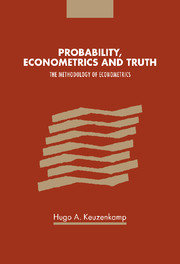Book contents
- Frontmatter
- Contents
- Introduction
- 1 The philosophy of induction
- 2 Probability and indifference
- Intermezzo: a formal scheme of reference
- 3 Relative frequency and induction
- 4 Probability and belief
- 5 The theory of simplicity
- 6 From probability to econometrics
- 7 Econometric modelling
- 8 In search of homogeneity
- 9 Positivism and the aims of econometrics
- 10 Probability, econometrics and truth
- Personalia
- References
- Name Index
- Subject Index
9 - Positivism and the aims of econometrics
Published online by Cambridge University Press: 22 September 2009
- Frontmatter
- Contents
- Introduction
- 1 The philosophy of induction
- 2 Probability and indifference
- Intermezzo: a formal scheme of reference
- 3 Relative frequency and induction
- 4 Probability and belief
- 5 The theory of simplicity
- 6 From probability to econometrics
- 7 Econometric modelling
- 8 In search of homogeneity
- 9 Positivism and the aims of econometrics
- 10 Probability, econometrics and truth
- Personalia
- References
- Name Index
- Subject Index
Summary
Science for the past is a description, for the future a belief; it is not, and has never been, an explanation, if by this word is meant that science shows the necessity of any sequence of perceptions.
Karl Pearson ([1892] 1911, p. 113)Introduction
A standard characterization of econometrics is to ‘put empirical flesh and blood on theoretical structures’ (Johnston, [1963] 1984, p. 5), or ‘the empirical determination of economic laws’ (Theil, 1971, p. 1). For Chow (1983, p. 1) economic theory is the primary input of a statistical model. Since the days of Haavelmo (1944), econometrics almost serves as an afterthought in induction: the inductive stage itself is left to economic theory, the statistical work is about the ‘missing numbers’ of a preconceived theory.
This is not how the founders of probability theory thought about statistical inference. As Keynes ([1921] CW VIII, p. 359) writes,
The first function of the theory is purely descriptive … The second function of the theory is inductive. It seeks to extend its description of certain characteristics of observed events to the corresponding characteristics of other events which have not been observed.
The question is to what extent econometrics can possibly serve those functions. In order to answer this question, I will characterize the aims of econometrics and evaluate whether they are achievable. I will argue that the only useful interpretation of econometrics is a positivist one.
Information
- Type
- Chapter
- Information
- Probability, Econometrics and TruthThe Methodology of Econometrics, pp. 213 - 261Publisher: Cambridge University PressPrint publication year: 2000
